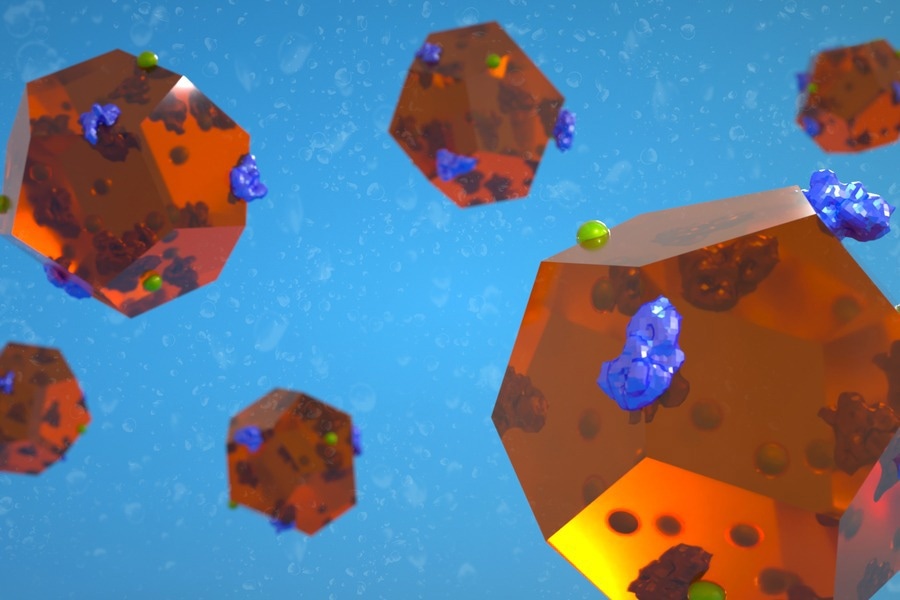Numerous vaccines, such as those for whooping cough and hepatitis B, contain bits of bacterial or viral proteins. These vaccines also often contain adjuvants, which are molecules that help enhance the response of the immune system to the proteins.
 MIT engineers designed a nanoparticle vaccine made from a metal-organic framework called ZIF-8, which is coated with the SARS-CoV-2 receptor binding protein (blue) and an adjuvant called Gdq (green). Image Credit: Courtesy of the researchers.
MIT engineers designed a nanoparticle vaccine made from a metal-organic framework called ZIF-8, which is coated with the SARS-CoV-2 receptor binding protein (blue) and an adjuvant called Gdq (green). Image Credit: Courtesy of the researchers.
Most adjuvants in vaccines are aluminum salts or other molecules that stimulate a nonspecific immune response. However, a team of researchers from the Massachusetts Institute of Technology (MIT) has recently demonstrated that a type of nanoparticle referred to as a metal-organic framework (MOF) can also elicit a powerful immune response. MOFs activate the innate immune system, the initial defense of the body against pathogens, through toll-like receptors on cell proteins.
In a mice-model study, the scientists demonstrated that this MOF could effectively capture and deliver a portion of the SARS-CoV-2 spike protein. Additionally, once the MOF was broken down inside cells, it acted as an adjuvant.
While further research is necessary to manipulate these particles for utilization in vaccines, the study suggests that this type of structure could be valuable for eliciting a robust immune response, according to the team.
Understanding how the drug delivery vehicle can enhance an adjuvant immune response is something that could be very helpful in designing new vaccines.
Ana Jaklenec, Study Senior Author and Principal Investigator, Koch Institute for Integrative Cancer Research, Massachusetts Institute of Technology
Robert Langer, an MIT Institute Professor and a member of the Koch Institute for Integrative Cancer Research, along with Dan Barouch, the director of the Center for Virology and Vaccine Research at Beth Israel Deaconess Medical Center and a professor at Harvard Medical School, are the study’s senior authors.
The study’s lead author is Shahad Alsaiari, a former MIT postdoc and Ibn Khaldun Fellow. The study has been published in the journal Science Advances.
Immune Activation
The researchers of this study investigated a MOF known as ZIF-8, which comprises a lattice of tetrahedral units consisting of a zinc ion attached to four molecules of imidazole, an organic compound. While earlier research had demonstrated that ZIF-8 could greatly enhance immune responses, the mechanism by which this particle activates the immune system was not well understood.
To examine this mechanism, researchers from MIT developed an experimental vaccine containing the SARS-CoV-2 receptor-binding protein (RBD) enclosed within ZIF-8 particles. These particles have a diameter of 100 to 200 nm, enabling them to enter the body's lymph nodes directly or via immune cells like macrophages.
Once inside the cells, the MOFs break down, discharging the viral proteins. The team discovered that the imidazole components then stimulate toll-like receptors (TLRs), which help to trigger the innate immune response.
This process is analogous to establishing a covert operative team at the molecular level to transport essential elements of the COVID-19 virus to the body’s immune system, where they can activate specific immune responses to boost vaccine efficacy.
Shahad Alsaiari, Study Lead Author and Ibn Khaldun Fellow, Massachusetts Institute of Technology
RNA sequencing of cells from the lymph nodes revealed that mice vaccinated with ZIF-8 particles containing the viral protein exhibited a robust activation of the TLR-7 pathway, resulting in increased production of cytokines and other molecules influencing inflammation.
Mice immunized with these particles showed a significantly robust response to the viral protein compared to mice that received the protein alone.
Not only are we delivering the protein in a more controlled way through a nanoparticle, but the compositional structure of this particle is also acting as an adjuvant. We were able to achieve very specific responses to the COVID protein, and with a dose-sparing effect compared to using the protein by itself to vaccinate.
Ana Jaklenec, Study Senior Author and Principal Investigator, Koch Institute for Integrative Cancer Research, Massachusetts Institute of Technology
Vaccine Access
While this study and others have shown the immunogenic potential of ZIF-8, further research is required to assess the safety of these particles and their scalability for mass manufacturing. If ZIF-8 is not pursued as a vaccine carrier, the insights gained from this study can guide researchers in developing similar nanoparticles for delivering subunit vaccines, according to Jaklenec.
Jaklenec added, “Most subunit vaccines usually have two separate components: an antigen and an adjuvant. Designing new vaccines that utilize nanoparticles with specific chemical moieties which not only aid in antigen delivery but can also activate particular immune pathways have the potential to enhance vaccine potency.”
Developing a subunit vaccine for COVID-19 offers an advantage, as these vaccines are typically easier and more cost-effective to manufacture than mRNA vaccines. This characteristic could facilitate their distribution worldwide, according to the researchers.
“Subunit vaccines have been around for a long time, and they tend to be cheaper to produce, so that opens up more access to vaccines, especially in times of pandemic,” Jaklenec stated.
The study was financially supported by Ibn Khaldun Fellowships for Saudi Arabian Women and partly by the Koch Institute Support (core) Grant from the US National Cancer Institute.
Journal Reference:
Alsaiari, K. S., et al. (2024) Zeolitic imidazolate frameworks activate endosomal Toll-like receptors and potentiate immunogenicity of SARS-CoV-2 spike protein trimer. Science Advances. doi: 10.1126/sciadv.adj6380